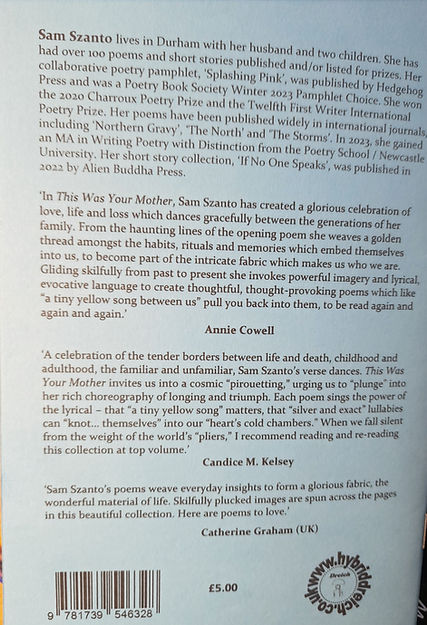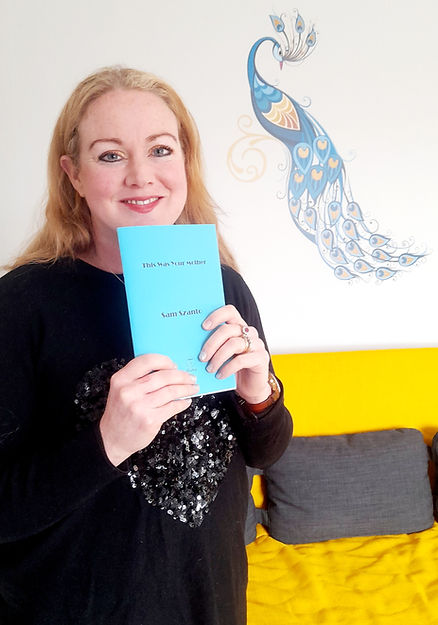20 Questions with... Susan Darlington
- samszanto2
- Nov 23, 2022
- 6 min read
Updated: Jan 7, 2023

Susan Darlington’s poetry regularly explores the female experience through nature-based symbolism and stories of transformation. It has been published in Dreich, Dream Catcher, Anti-Heroin Chic, Hedgehog Press, and Ethel Zine among others. She has three books available: Never Wear White (Alien Buddha Press, 2022), Traumatropic Heart (Selcouth Station, 2021) and Under the Devil’s Moon (Penniless Press Publications, 2015).
Follow her at @S_sanDarlington
Please introduce yourself. Where are you from? What was your life like growing up?
I currently live in Leeds and grew up on the outskirts of a small town in West Yorkshire that was briefly famous for its nineteenth century hydrotherapy spa. It later became more well-known for its small mines and mills, most of which had closed down by the time I was born. Its industrial past nonetheless scarred the land: we played on fields that had been slag heaps and a neighbouring house suffered subsidence due to old mines. The most notable thing about it as a teenager was it being home to comedy pop band Black Lace and being namechecked in the KLF’s 1991 song ‘It’s Grim Up North’.
Did you always want to be a writer? If you also work, what do you do / did you do?
I have a vivid memory of being tasked at junior school to draw a picture of our future career. Mine showed me sat behind a desk, pen and paper at hand, and shelves lined will all the books I’d had published. The reality has been somewhat different! That gravitation towards the written word has never gone away but I have to carve out time to draft poems while working full time, currently in the public sector.
Tell us about your most recently published work in a sentence.
Never Wear White (Alien Buddha Press) combines real-life experience with fairy-tale elements to explore various aspects of what it can mean to be a woman.

What are you working on right now?
I’ve had two chapbooks published in the space of as many years: Never Wear White (Alien Buddha Press, 2022) and Traumatropic Heart (Selcouth Station, 2021). I now want to concentrate on writing without any pressure to publish, giving myself the space to explore new themes and develop my creative voice.

Do you have a writing routine, and if so what is it?
I grab whatever time I can between other commitments to write. I’ll typically jot down ideas as and when they arise, which is often when I’m walking, but then I might not have time to return to them for a few days or even weeks. The ideas that particularly grab me percolate at the back of my mind so that when I do have time to write, the poem will often emerge almost fully formed. I find that the pieces I have to edit numerous times, having gone through this process, are the ones that feel laboured and lack spark.
Where do you write – always in the same space, or different places? Can you write ‘on the move’?
I frequently get ideas when I’m walking in green spaces – there’s something about the physical movement and the environment that gives me the mental space to free associate or to fine tune ideas. I’ll jot them down on my phone as soon as they arise but I tend to need a quiet space to fully draft and edit poems.
What advice do you have for other authors who are starting out? What is the best advice you’ve heard?
There’s no great secret: keep reading and keep writing! I’d encourage new writers to find their own voice(s) rather worrying about what other people think, to mark their personal achievements rather than comparing themselves to what others have done, and to acknowledge that failure is part of the learning process. It can also be useful to create their own community, whether that’s through local writing groups or on social media, as we all need a supportive voice from time to time.
Do you enjoy doing live readings or are they a necessary evil – or somewhere in between?
I’m naturally introverted, so doing live readings pushes me out of my comfort zone. In working to improve my delivery and performance style, however, I’ve developed my confidence. I still far prefer to read books in private but live readings can be a valuable way to give and receive feedback. It can also be transformative to hear an author reading their own work; where they pause or put stresses can completely change the meaning of a poem.
Are there recurring themes in your work? Where do you feel these emanate from if so?
Nature features heavily in my work, either as the focus or the backdrop to the main subject. It also tends to be told from a female perspective. These themes reflect my personal interests and areas of inspiration. I’ve tried to challenge myself to write with a more city / industrial focus; I love how songwriters like Brett Anderson (Suede) and Jarvis Cocker (Pulp) find the beauty in such landscapes but, in general, they just leave me cold.
Should writers have a moral purpose? What is the purpose of a writer in today’s society?
Writers, and creative practitioners in general, are very good at raising moral dilemmas. They can also be very good at making us sympathise with characters that have a questionable moral compass, such as Alex in A Clockwork Orange and Humbert Humbert in Lolita. That moral purpose can be the responsibility of the reader as much as the writer, although in neither case is it a necessity. Likewise, there is no intrinsic purpose of a writer in today’s society, although it would be a morally bankrupt society where they were not allowed to thrive.
Do you write between genres or not?
Poetry is my main creative output, but I do also write music and theatre reviews for a number of different publications (including Loud & Quiet and Yorkshire Evening Post).
Which living writers do you most admire?
There’s much to admire in the way Margaret Atwood has used her platform to raise issues around women’s rights and climate change. There’s no moral imperative for her to do so – to refer to your earlier question – but I respect her generosity of spirit in that respect.
Which dead writers do you most admire?
One of the first poets I read who made an emotional connection with me was Sylvia Plath. I’ve just read Heather Clark’s excellent biography, Red Comet, which successfully reframes her life through passion and commitment to her art rather than death. It made me return to her work and admire afresh the artistic leaps she made within such a short space of time.
What’s the book you wish you’d written?
There are so many! I’d like to combine the windswept passion of Wuthering Heights with the magic realism of Angela Carter’s The Magic Toyshop and the gothic fantasy of Mervyn Peake’s Gormenghast. Those books are all wildly inventive yet make valid comments about society (the pageantry surrounding Queen Elizabeth’s funeral was straight out of Gormenghast!).
What other external influences do you have: nature/place, music etc?
I get the majority of my ideas when walking in green spaces, reflecting on the changing seasons and colours. I also like art to be a conversation with other people, so I’m often influenced in some way by a painting, piece of music, or news story. It’s important to have a constantly active ‘ideas radar’, as inspiration can come from the most unlikely places!
Do you suffer from ‘writer’s block’ and how do you overcome it if so?
I have periods when I struggle to write anything original, when I feel like I’m just repeating myself. This is extremely frustrating but I’ve come to recognise that it means I’m subconsciously working through an internal block and moving into a new phase of writing. During these times I tend to focus on close reading of other people’s work and exploring what pieces resonate with me and why, so that I can apply any learnings to my own poetry.
What’s been your favourite reaction to your writing?
It’s an honour when people tell me they can relate to my writing, or that it’s opened up a conversation about an experience they’ve previously kept secret. This most recently happened with my poem ‘Carrie’, which is about the fear of menstrual blood leaking through clothing. I read it on a podcast and it sparked a fascinating exchange about body shame, puberty, and feelings of exclusion.
How do your family and friends feel about your writing?
My best friend is my biggest supporter and cheerleader. My father is also a writer and he’s encouraged and championed me from being young. I probably don’t thank either one of them enough!
Do you have a favourite bookshop?
Whenever I visit a new town I head straight for the second-hand bookshops, which are often a treasure trove of oddities. I’ve had great finds over the last couple of years in Mrs Lofthouse's Emporium (Scarborough) and Barter Books (Alnwick).
How do you see the future of writing? Will we become more or less dependent on Amazon?
Companies – like nations - rise and fall. I’d like to think that Amazon will be replaced by a more sustainable, ethical organisation but that lies largely in the hands of us as consumers. However we buy and consume books, the desire to learn or be transported into another world through the written world will always remain.










Comments